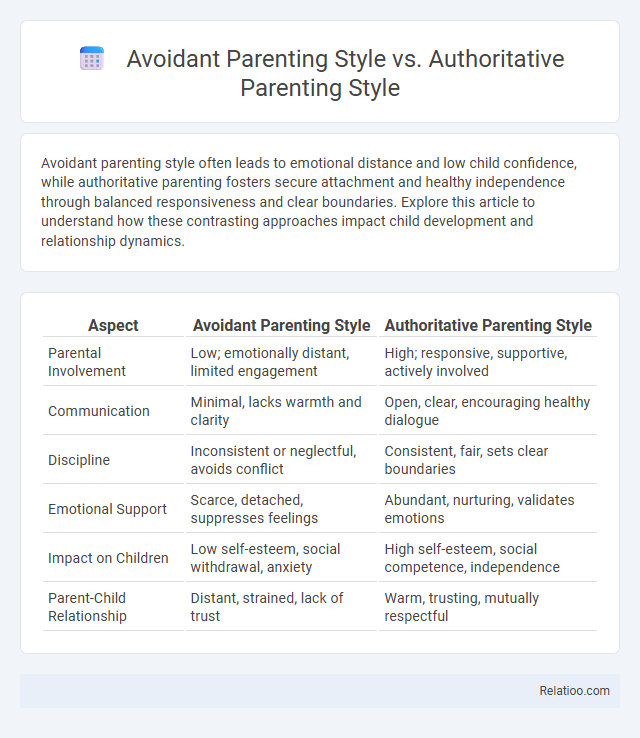Avoidant parenting style often leads to emotional distance and low child confidence, while authoritative parenting fosters secure attachment and healthy independence through balanced responsiveness and clear boundaries. Explore this article to understand how these contrasting approaches impact child development and relationship dynamics.
Table of Comparison
| Aspect | Avoidant Parenting Style | Authoritative Parenting Style |
|---|---|---|
| Parental Involvement | Low; emotionally distant, limited engagement | High; responsive, supportive, actively involved |
| Communication | Minimal, lacks warmth and clarity | Open, clear, encouraging healthy dialogue |
| Discipline | Inconsistent or neglectful, avoids conflict | Consistent, fair, sets clear boundaries |
| Emotional Support | Scarce, detached, suppresses feelings | Abundant, nurturing, validates emotions |
| Impact on Children | Low self-esteem, social withdrawal, anxiety | High self-esteem, social competence, independence |
| Parent-Child Relationship | Distant, strained, lack of trust | Warm, trusting, mutually respectful |
Introduction to Parenting Styles
Avoidant parenting style involves emotional distance and limited responsiveness, which can hinder a child's social and emotional development. Authoritative parenting style balances warmth and structure, promoting independence and positive behavior through clear expectations and consistent support. Conflict avoidance in parenting often prevents addressing issues directly, potentially leading to unresolved problems and diminished communication within the family dynamic.
Defining Avoidant Parenting Style
Avoidant parenting style is characterized by emotional detachment, minimal involvement, and a tendency to neglect the child's needs and development. Distinct from authoritative parenting, which emphasizes warmth, structure, and open communication, avoidant parents often fail to provide consistent support or guidance. This style can lead to emotional insecurity and difficulties in relationship-building, contrasting sharply with authoritative methods that foster resilience and social competence.
Defining Authoritative Parenting Style
Authoritative parenting style combines high responsiveness with firm expectations, promoting open communication and emotional support while setting clear boundaries. This approach encourages Your child's independence and social competence by balancing warmth and discipline effectively. In contrast, avoidant parenting typically lacks engagement, whereas conflict avoidance may undermine healthy problem-solving, making authoritative parenting the most balanced for positive development outcomes.
Emotional Impact on Children
Avoidant parenting style often leads to emotional neglect, causing children to feel unvalued and develop low self-esteem, whereas authoritative parenting fosters emotional security through consistent support and clear boundaries, promoting resilience and healthy self-regulation. Conflict avoidance in families can result in suppressed emotions and unresolved issues, increasing anxiety and difficulty in expressing feelings for children. Emotional impact studies show that children raised by authoritative parents exhibit better social competence and emotional intelligence compared to those experiencing avoidant parenting or family conflict avoidance.
Communication Patterns and Parent-Child Interaction
Avoidant parenting style often leads to limited communication and emotional suppression, causing children to feel disconnected and hesitant to express their feelings, whereas authoritative parenting fosters open dialogue, emotional support, and consistent boundaries that promote secure attachment and healthy self-esteem. Conflict avoidance in parent-child interaction typically results in unresolved issues and passive communication, hindering the development of problem-solving skills and emotional regulation. Authoritative parents balance warmth and control, encouraging assertive communication and mutual respect, which contrasts sharply with the withdrawal or passive-aggressive patterns seen in avoidant or conflict-avoidant dynamics.
Effects on Child’s Social Development
Avoidant parenting style often leads to children developing social withdrawal and difficulty forming close relationships due to inconsistent emotional support. In contrast, authoritative parenting fosters strong social skills, empathy, and confidence by combining warmth with clear boundaries and communication. Conflict avoidance in parenting can hinder a child's ability to manage interpersonal challenges effectively, resulting in reduced problem-solving skills and increased social anxiety.
Academic and Behavioral Outcomes
Avoidant parenting style often leads to poor academic performance and increased behavioral problems due to lack of parental engagement and emotional support, while authoritative parenting style promotes higher academic achievement and positive social behaviors through balanced discipline and warmth. Conflict avoidance in parenting tends to result in unresolved issues, fostering anxiety and low self-esteem in children, which can negatively impact both academic success and emotional development. Research consistently shows authoritative parenting as the most effective approach for optimal academic and behavioral outcomes, emphasizing clear communication and consistent expectations.
Long-term Consequences of Each Style
Avoidant parenting style often leads to long-term consequences such as low self-esteem, poor emotional regulation, and difficulties forming close relationships due to lack of consistent guidance and support. Authoritative parenting style is linked to positive long-term outcomes including higher academic achievement, strong social skills, and emotionally healthy, independent adults as it balances warmth with clear boundaries. Conflict avoidance in parenting can result in unresolved issues, increased anxiety, and weakened communication patterns, ultimately hindering a child's ability to manage stress and conflict effectively in adulthood.
Strategies for Shifting Towards Authoritative Parenting
Shifting towards authoritative parenting involves setting clear expectations while maintaining warmth and open communication, contrasting avoidant parenting's neglect of emotional connection and conflict avoidance's tendency to sidestep difficult conversations. Effective strategies include active listening, consistent discipline paired with empathy, and encouraging child autonomy to foster trust and mutual respect. Implementing these techniques helps break avoidant patterns and promotes a balanced approach where healthy boundaries coexist with emotional support.
Conclusion: Choosing the Best Approach for Child Development
Understanding the differences between avoidant parenting style, authoritative parenting style, and conflict avoidance is crucial for fostering healthy child development. Authoritative parenting, characterized by clear expectations and emotional support, consistently leads to better social, emotional, and academic outcomes compared to avoidant or conflict-avoidant approaches. You can promote your child's growth most effectively by adopting authoritative strategies that balance guidance with open communication.

Infographic: Avoidant Parenting Style vs Authoritative Parenting Style
 relatioo.com
relatioo.com